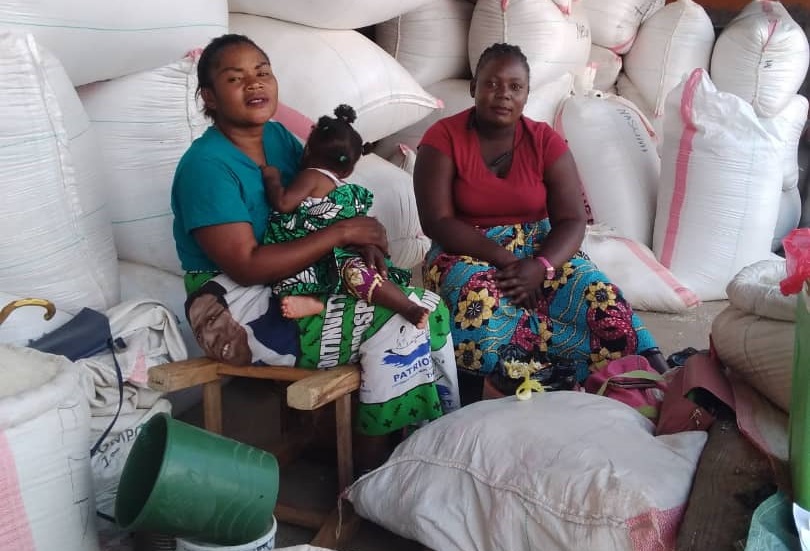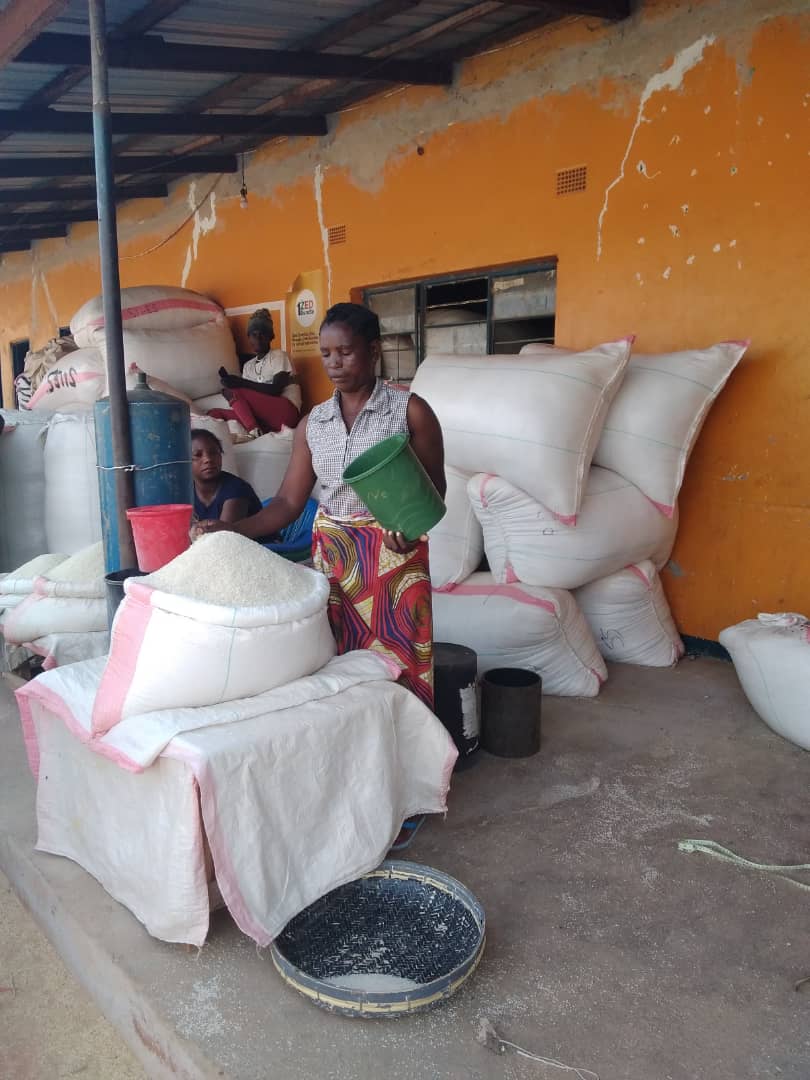WOMEN SOAR IN RICE TRADE AS E-SAPP SET TO PROPEL PRODUCTION IN ISOKA

- By SEBASTIAN CHIPAKO
- Tags Stories Livestock
SARAH Chanda has been selling rice for the past 48 years, she is an epitome of resilience and perseverance in a trade that was largely dominated by men when she was just starting out.
She has wandered all the rice hot spots in Isoka district in Muchinga province in search of good quality rice to buy for the lucrative Copperbelt and Lusaka markets.
When she was starting out in the trade, conditions were very hard as buyers would be marooned at the famous Mwaiseni junction waiting for Nsenga rice farmers from Chibale area who were dominating supply at the time.
She explains that at the time there were only two women in a group of men waiting at the famous Mwaiseni junction buying rice.
“At the time, the rice the Nsengas used to bring was shelled using a traditional Mortar locally known as ibende so the quality was quite poor,” she explains.
Ms Chanda passionately narrates that a number of changes occurred over a period of time with a number of local business men buying Rice mills and this helped improve the quality of Rice.
She explains that one of the things that never changed was the edge the famous Nakonde rice has had in terms of quality and market over the budding Isoka rice.
On the other hand, one of the notable changes was an increase in the number of women venturing in the rice trade, especially selling of the product around rice mills.
The veteran rice trader, who has been a widow for some time explains that in the recent past, with government’s support, NIZA Mills was identified as a service provider under the Enhanced Smallholder Agribusiness Promotion Programme (E-SAPP), Isoka rice has grown in prominence and is now giving Nakonde rice stiff competition.
“The quality is very good, the machine is able to remove stones and polish the rice, the end product cannot be distinguished from Nakonde rice. It is only when a competitor at the market especially in Lusaka mentions the source that a customer would know,” she explains.
Government through E-SAPP, with financial support from the International Fund for Agricultural Development (IFAD) has been fostering the development of the rice value chain in Muchinga province with Isoka district being targeted.
The K1.2 Matching grant support to NIZA mills is one of the initiatives to not only improve the quality of the product for marketing but also increase production.
Interestingly, in addition to the rice farmers, it is the women and youth who have directly benefited from the Rice processing machine as they are involved in selling processed rice and other by-products whose prices have escalated due to the improved quality.

Phales Namonje, a 31 year old woman of Isoka, unlike Sarah Chanda, patronises the NZA Mills premises selling rice. She indicated that a number of women sell rice just within NIZA mills while others travel from other towns to buy rice for other markets such as Kasumbalesa, Lusaka and the Copperbelt.
Phales who has been selling rice at the spot for 10 years has so much praise for the quality of rice which has tremendously improved since the rice processing machine was installed.
This youthful trader has called for financial support in form of loans to women involved in the rice business so that more women are empowered as traders and a bigger market provided for rice farmers.
While a number of women have been eking out a living through the sale of rice, a 21 year old youth has been buying rice bran from Niza mills and transporting the bags of the commodity to markets in Lusaka.
Elastus Chama from Kasama buys rice bran from NIZA mills in Isoka district and sells in Lusaka where he mentioned that the market is huge as it is used to make feed for livestock including fish.
He explains that since the installation of the processing mill, he has been able to purchase 750 by 50 kilogramme bags of the much sort after commodity within 7 days.
Elastus revealed that business has been good such that he is able to save money to pay for his education which he intends to start next year.
The programme has supported rice farmers in the district in a number of ways including procuring two tractors and other implements at a cost of K1.6 million, which has been hailed as a game changer in the rice value chain and agriculture subsector in the district.
Isoka District Agricultural Coordinator Lameck Chola explains that the equipment were handed over to two Farming As A Business groups (FaaBS) in two agriculture camps, namely; Kampumbu and Kantensha.
“The tractors are going to propel production and productivity from the current 1.8 tonnes per hectare to 2.5 metric tonnes per hectare. Farmers will open up huge areas for rice production,” he revealed.
He further disclosed that since inception of the project in 2019 over 2,000 farmers have benefited directly and indirectly from the various interventions government and partners have rolled out.
Mr Chola revealed that to ensure sustainability of the programme and mutual benefit of all parties along the rice value chain, government through the ministry is working on binding producers and the service provider through signing of contracts.
He explained that the programme has become part of the ministry activities over the years. Therefore, monitoring and ensuring equipment is fully utilized will be done rigorously.
Mr Chola emphasized the need for more cooperating partners to emulate efforts by IFAD and support enhancement of production of other crops as more still needs to be done to achieve increased production and productivity in many other crops.
NIZA Mills Proprietor Niza Sikombe unveiled plans to upgrade the current machine with a grader and purchase another more advanced machine.
He adds that production is projected to increase hence the need to constantly upgrade to meet the never ending demands of the producers.
Mr Sikombe echoed the need to sell the brand of Isoka rice aggressively. He lamented that it is not usually recognized as coming from lsoka, instead sellers prefer calling it Nakonde rice when they take it to markets.
Rice production is indeed going to increase especially with the availability of the much needed machinery in production and processing.
There is need therefore for other business minded individuals and institutions to take advantage of this prospect and begin supplying quality seed to farmers. There is also need for easing transportation challenges being faced by the ministry so that monitoring is done regularly.
More still needs to be in mechanization of the agriculture sector from production all the way through to processing as espoused in the 8th National development plan and for farmers to reap maximum benefits from farming. -NAIS
